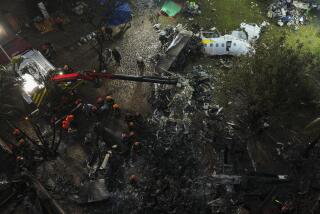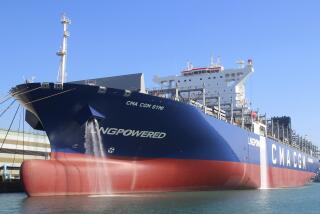Survivors Tell of Hijacked Jet’s Final Moments
- Share via
PARIS — One engine had already stopped for want of fuel when the pilot told passengers to brace for a crash landing. Below, the Indian Ocean, gleaming azure, rapidly grew closer. To many passengers, it seemed that the end was seconds away.
“We already knew that we were going to die,” said N. B. Surti, a survivor from India.
On Saturday, an Ethiopian Airlines Boeing 767 crashed into the sea off the Comoro Islands after it was commandeered by hijackers and forced to fly until its fuel tanks ran dry.
At least 72 of the 175 passengers and crew were killed, and 48 more were missing a day later and feared dead.
But 55 people survived and gave a harrowing account of ill-fated Flight ET 961, which was supposed to travel from Addis Ababa, Ethiopia, across Africa to Abidjan, Ivory Coast, but was hijacked by a trio of Ethiopians who “wanted to make history” and fly to Australia.
“They were not high-tech hijackers,” said Frank Huddle, 53, U.S. consul general in Bombay, who was on board with his wife, Shania. “But they were terrorists, and they did not let the pilot communicate with us.”
There were four Americans aboard the aircraft, according to a spokesman for the U.S. Embassy in Nairobi, Kenya. He said three survived, but he gave no further details.
The Huddles, who planned to get off at the flight’s first stop, Nairobi, for a game park holiday in Kenya, were seated in business class in the front of the aircraft.
“Ten minutes before we went down, the pilot said: ‘We have lost one engine. We are running out of fuel. We are going to have a crash landing. Get ready,’ ” the U.S. diplomat recalled.
“I thought I was dead when we hit the water,” Huddle said.
Witnesses said the Boeing, like a skimming pebble, struck the sea four times--flipping over at least once--before breaking into three large sections about 100 yards off the northern shore of Grande Comore, the largest island in the Comoro chain, a former French colony.
“The first bump was really gentle,” Huddle said. “Then the second one was really hard. The third one was even harder, like a 70-mph auto accident. The last one was like an earthquake.”
The Huddles managed to swim free of the plane’s wreckage. Huddle suffered severe cuts on his legs and feet, and was evacuated to the French island territory of Reunion via a French military transport.
Surti, the Indian, said he battled his way through floating cadavers to live.
“Five or six times I went up and down in the water. I wanted very much to survive,” he said. “I fought through all the bodies and everything, and grabbed a broken part of the plane. Slowly, slowly I came out.”
The pilot, Leul Abate, 42, suffered head injuries but survived. He told reporters from his hospital bed that there were three hijackers and that they wanted to go to Australia but that they made no other demands.
“The hijackers wanted to make history,” Abate said.
The trio forced their way into the cockpit 15 minutes after takeoff. One was wielding a small ax, apparently the one kept in the plane for emergency use. A second carried a small fire extinguisher, also from the plane, and the third said he had a bomb in his hand, although the pilot said he couldn’t see it. In his other hand, the man held a bottle of whiskey.
The terrorists beat up the co-pilot, Yonas Mekuria, 35, and tossed him into the main cabin. Mekuria, who also survived the crash, said that, although Abate insisted the plane was running out of fuel, the hijackers refused to let him land at the island’s international airport, about five miles from the spot where the plane finally ditched.
It was the 17th time in six years that Ethiopians have been involved in a hijacking. Since the Communist regime of Mengistu Haile Mariam was overthrown in 1991 by partisans of the current prime minister, Meles Zenawi, Ethiopia has been plagued by terrorist acts, including hijackings by soldiers of the ousted government.
According to Bisrat Alemu, an Ethiopian passenger, the hijackers made an announcement in Amharic, Ethiopia’s official language, soon after commandeering the jet.
“They said: ‘We escaped from prison. We are against the government. We are hijacking the plane. We have an explosive. If anybody moves, we’ll explode it.’ ”
Two of the hijackers survived the crash, were arrested and are being interrogated by Comoran police.
George Marray, chief pilot for the Comoran national airline, praised Abate for bringing the plane down near a shallow reef next to a resort hotel where there was plenty of help.
When the Boeing slammed into the sea, tourists sunbathing on the beach rushed to assist in the rescue. Divers toiled throughout the night to recover bodies, but officials said Sunday they need at least 36 hours more and heavy cutting equipment, underwater lighting and protective diving gear to recover remains still trapped in partially submerged wreckage.
By Sunday evening, the bodies of 72 victims had been retrieved from the water, Comoran officials said.
More to Read
Sign up for Essential California
The most important California stories and recommendations in your inbox every morning.
You may occasionally receive promotional content from the Los Angeles Times.













